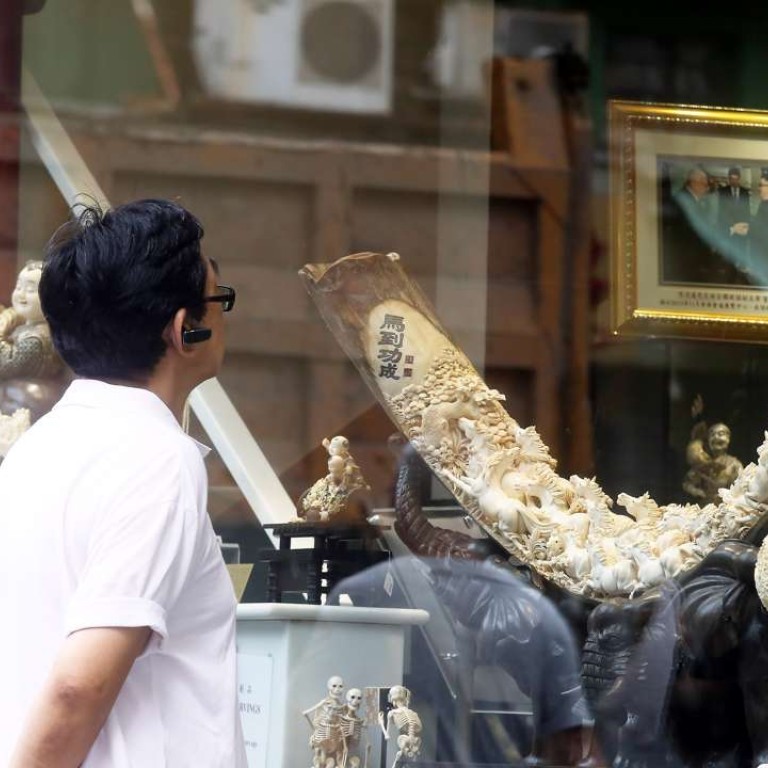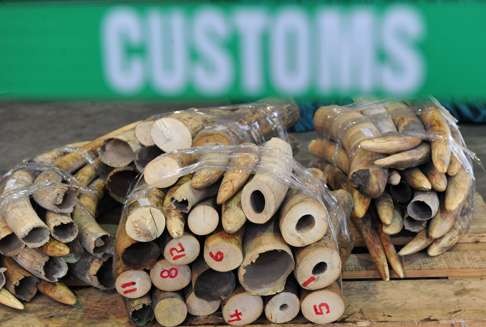
Five years to ban Hong Kong ivory trade is too long, lawmakers argue
Legislators push for a two-year time frame, but officials say 2021 is ‘fair and just’ to clear stocks
Hong Kong lawmakers from across the political spectrum are asking why legislation to ban the domestic trade in legal ivory cannot come sooner than is being proposed.
But officials are sticking to their argument that five years up to 2021 is “fair and just” and would spare them from legal challenges from a trade now subject to a licensing regime to possess and sell.
The three-step legislative plan was discussed by the Legislative Council’s environmental affairs panel for the first time on Monday.
The legislation would ban trade in hunting trophies and ivory carvings, followed by a trade ban on ivory acquired before a 1975 convention regulating the trade in endangered species, and finally, the total ban of all sales of ivory obtained before 1990, when a global trade ban was enacted.
The government says the local ivory trade is “generally inactive”.
Dr Kenneth Chan Ka-lok of the Civic Party asked what would become of unsold stocks once the deadline arrived, given that traders would not receive compensation?
“The law prevents them from selling but you cannot confiscate it from them either because the Basic Law protects private property,” Chan said, raising concern as to whether such ivory could enter the black market.
Chan pointed to a WWF-Hong Kong legal study last week that suggested that a ban could be enforced in two years.

“We are not persuaded. If the trade is not active anymore, why is there a need for another five years?” she asked. Echoing the WWF’s calls, Quat said licences allowing possession of ivory should not be renewed once the new laws came into effect.
Dr So Ping-man, acting deputy director for the Agriculture, Fisheries and Conservation Department, said licences could only be revoked under exceptional circumstances, such as if a licensee falsified information in an application.
“All licences last for five years and have a deadline. Under current laws, the director of [the AFCD] has no way of revoking these licences.”
Assistant director for environmental protection Elvis Au Wai-kwong said: “There must be enough time for traders to get rid of their stocks ... We need to be fair and just.”
The plan will be tabled to Legco in the first half of next year.
WWF-Hong Kong conservation director Gavin Edwards said 30,000 African elephants were being lost to illegal poaching each year, so there was no time to lose. “We must act now and ban the ivory trade in Hong Kong starting today.”
WildAid campaigner Alex Hofford agreed but said in the meantime the government could step up enforcement against ivory traders with known criminal links and enhance cooperation with NGOs on enforcement activities.
Panel members also discussed new measures proposed to protect incense trees in Hong Kong from being illegally felled and smuggled across the border into mainland China, including increased patrols and stricter penalties.
But lawmaker Albert Chan Wai-yip said this was not enough and suggested the AFCD train sniffer dogs to catch tree thieves and smugglers.
There were 120 cases of illegal incense tree felling in 2015, up from 72 in 2011. There were only five prosecutions last year, three of which ended in convictions, compared with 28 prosecutions, all ending in convictions, in 2011.

